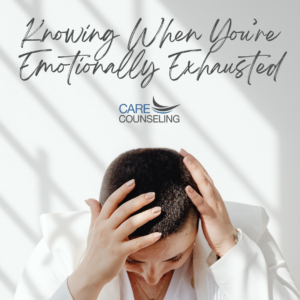Knowing When You’re Emotionally Exhausted
 Life is filled with ups and downs, and it’s perfectly normal to experience a range of emotions along the way. However, there comes a point when these emotional fluctuations can take a toll on your mental well-being, leading to emotional exhaustion. In this blog, we’ll explore what emotional exhaustion is, how to recognize its signs, and most importantly, how to find balance and rejuvenate your emotional health.
Life is filled with ups and downs, and it’s perfectly normal to experience a range of emotions along the way. However, there comes a point when these emotional fluctuations can take a toll on your mental well-being, leading to emotional exhaustion. In this blog, we’ll explore what emotional exhaustion is, how to recognize its signs, and most importantly, how to find balance and rejuvenate your emotional health.
Understanding Emotional Exhaustion
Emotional exhaustion is not just a bad day or a temporary feeling of sadness; it’s a persistent and overwhelming state of emotional depletion. It typically arises from prolonged periods of stress, excessive emotional demands, or unresolved emotional issues. While everyone can experience emotional exhaustion at some point in their lives, it is important to recognize it and take proactive steps to address it.
Signs of Emotional Exhaustion
- Constant Fatigue: One of the most common signs of emotional exhaustion is a feeling of constant fatigue, even after a full night’s sleep. You may find it difficult to muster the energy for everyday tasks.
- Irritability: Emotional exhaustion often leads to increased irritability. You may become easily agitated, snapping at loved ones or colleagues over minor issues.
- Difficulty Concentrating: Your ability to focus and concentrate may decline, making it challenging to perform well at work or engage in meaningful conversations.
- Emotional Numbness: Paradoxically, emotional exhaustion can lead to emotional numbness. You may feel detached from your own feelings, struggling to connect with others on an emotional level.
- Physical Symptoms: Emotional exhaustion can manifest physically, leading to headaches, muscle tension, and gastrointestinal problems.
- Reduced Empathy: Your capacity for empathy and understanding may decrease, making it difficult to support others emotionally.
- Loss of Interest: Hobbies and activities that once brought you joy may no longer hold your interest.
Coping with Emotional Exhaustion
Recognizing the signs of emotional exhaustion is crucial, but taking action to address it is equally important. Here are some strategies to help you cope:
- Self-Care: Prioritize self-care by getting adequate sleep, eating a balanced diet, and engaging in regular physical activity. These basic practices can significantly improve your emotional resilience.
- Set Boundaries: Learn to say no when you feel overwhelmed by commitments or demands. Setting clear boundaries helps protect your emotional energy.
- Seek Support: Talk to a trusted friend, family member, or therapist about your feelings. Sharing your emotions with others can provide relief and valuable insights.
- Practice Mindfulness: Mindfulness and meditation techniques can help you stay present and reduce stress. These practices can also improve your emotional regulation.
- Take Breaks: Give yourself permission to take short breaks during the day, even if it’s just a few minutes to breathe deeply and clear your mind.
- Limit Exposure to Stressors: Identify and minimize sources of chronic stress in your life, whether they be related to work, relationships, or other factors.
- Emotional Journaling: Keeping a journal can help you gain clarity about your emotions and identify patterns of emotional exhaustion.
Finding Balance and Healing
Recovering from emotional exhaustion is a journey that requires time and effort. It’s essential to be patient with yourself and seek professional help if needed. Here are some additional steps to help you find balance and healing:
- Practice Self-Compassion: Be kind and forgiving toward yourself. Understand that emotional exhaustion is not a sign of weakness but a natural response to stress.
- Set Realistic Expectations: Avoid setting impossibly high standards for yourself. Focus on achievable goals and celebrate your successes, no matter how small they may seem.
- Reconnect with Your Passions: Rekindle your interest in activities that bring you joy. Reconnecting with your passions can reignite your emotional energy.
- Engage in Therapy: If emotional exhaustion persists or becomes overwhelming, consider seeking therapy or counseling. A mental health professional can provide guidance and support tailored to your needs.
Recognizing when you’re emotionally exhausted is the first step towards healing and finding balance in your life. It’s essential to listen to your body and emotions, take proactive steps to reduce stress, and prioritize self-care. Remember that emotional exhaustion is a common experience, and with the right strategies and support, you can regain emotional well-being and resilience.



























